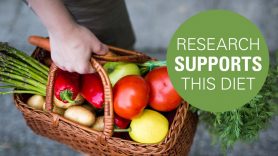A plant-based diet can help lower your cancer risk
How to choose the best diet
Plenty of diets promise weight loss and health benefits, but are any of them the best diet for you? Our dietitian weighs in on some popular diet trends and offers advice on healthy eating over the long term.

If you want to make better food choices, reduce your cancer risk or lose unwanted pounds, choosing the right diet can be intimidating.
You can pick from a long list of diets that sound pretty simple: Ramp up one nutrient, like fat, eliminate another, like carbs or eat at certain times of the day to get results with no sacrifice.
If you are considering a new eating plan, the first thing to watch out for is a diet that requires you to cut out an entire food group. These diets are hard to stick with, and can rob you of healthy nutrients.
Another red flag: A promise of quick weight loss. Rapid weight loss diets may not be healthy, and probably are not sustainable, so you end up gaining the weight back again. And losing more than 2 pounds a week indicates you may be losing water and lean muscle.
"The frustrating part for most people is that healthy diets that help you lose weight safely and keep it off over the long term typically do not offer quick results," says Lindsey Wohlford, Employee Wellness dietician at MD Anderson.
We talked with Wohlford about the pros and cons of some popular diets. Here's what she had to say.
6 diets reviewed

The ketogenic or keto diet
The ketogenic diet, also called the keto diet, focuses on getting most of your calories from fat (70-80%) and some from protein, while drastically cutting carbohydrates.
While the diet does promote weight loss, there are drawbacks. First, although it has been used since the 1960’s in children with epilepsy, there is a lack of research on the long-term health effects in adults. Second, because the diet is so restrictive, it is not sustainable for most people. Last, the diet cuts out or severely limits many healthy foods, like fruits, vegetables, beans and whole grains.

The paleo diet
The paleo diet is based on what practitioners believe early humans ate. The idea is that our bodies did not evolve to eat today’s typical diet and returning to how our ancestors ate is healthier.
The diet is made up mostly of grass-fed meat, fish, nuts, seeds, fruits and vegetables. It excludes dairy, grains, legumes, processed foods and sugar.
While it is beneficial to leave processed foods out of your diet, eliminating whole grains and legumes cuts out good sources of fiber and many nutrients. The diet may help you eat more whole foods and lose some weight, but it can be hard to stick to.

The Whole30 diet
The Whole30 diet is a 30-day clean-eating plan that eliminates sugar, alcohol, grains, legumes, soy and dairy. The diet allows meat, seafood, nuts, seeds, eggs, vegetables and fruit. After 30 days, foods are strategically re-introduced to determine if they impact the body.
Eliminating processed foods and focusing on whole foods are certainly beneficial. However, the diet eliminates whole grains and legumes, which are healthy staples in a plant-based diet.
This diet is not meant to be sustainable, and does not promote long-term diet changes to help you maintain a healthy weight.

The Mediterranean diet
This diet encourages people to make a life-long commitment to good nutrition. It's based on the way many people from the Mediterranean region eat. The diet emphasizes vegetables, fruits, whole grains, nuts, legumes, olive oil and fish and seafood. The diet allows poultry, eggs, cheese and yogurt in moderation. Sweets and red meat are saved for special occasions.
Research supports following the Mediterranean diet. The diet is largely plant-based and includes many anti-inflammatory foods, which have been shown to reduce chronic diseases such as heart disease, diabetes, Alzheimer's disease and cancer. It may also help you lose weight.

Intermittent fasting
Intermittent fasting is not a diet but a technique to decrease
calories by introducing periods of fasting. The theory is that it may
help reduce blood sugar and insulin levels, resulting in fat
loss.
Under the plan, you can eat what you want during periods of
non-fasting. There is no emphasis on choosing healthy foods.
However, if you make healthy food choices, it may help reduce calorie intake and promote weight loss. Studies have shown it to be as effective as conventional calorie restriction for weight loss.

Your best bet for a healthy diet: Go plant-based
So what's the best choice for a healthy, sustainable eating plan that will help you manage your weight and reduce your cancer risk? The following tips are the foundation for long-term weight management and healthy eating.
Eat a plant-based diet. Fill 2/3 or more of your plate with plant foods like vegetables, fruits and whole grains. Fill the remaining 1/3 or less with lean protein like chicken or fish.
Limit red meat and avoid processed meat. Eat no more than 18 ounces of cooked red meat per week. Red meat includes beef, pork and lamb. Processed meat includes bacon, deli meat and hot dogs.
Avoid alcohol. Research shows that drinking even a small amount of alcohol increases your chances of developing oral, breast and liver cancers. The National Cancer Institute recommends that women have no more than one drink per day and men have no more than two drinks per day.
And to give your health and your waistline a real assist, aim for at least 150 minutes of moderate exercise or 75 minutes of vigorous exercise each week.



